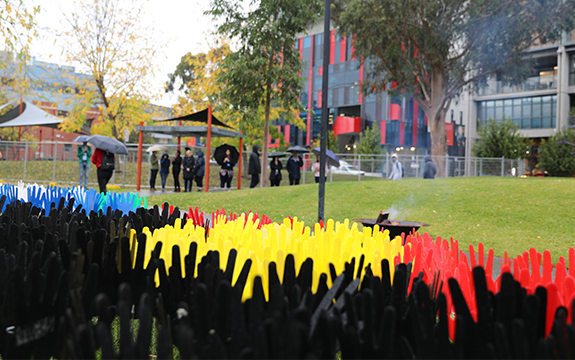Commemorating National Sorry Day together

In Summary
- Swinburne Vice-Chancellor Professor Linda Kristjanson AO delivers her message for National Sorry Day 2020
- Swinburne’s Moondani Toobadool Centre team organised a reflection event and activities for staff members
- As an elevate Reconciliation Action Plan organisation, Swinburne supports opportunities to acknowledge our shared history and culture
At Swinburne, National Sorry Day is commemorated as an opportunity for our community to focus on justice and healing as part of the reconciliation process.
National Sorry Day (26 May) acknowledges the mistreatment of Aboriginal and Torres Strait Islander children impacted by government policy. It reminds us of the injustice to the Stolen Generation and prompts wider Australia to recognise and commemorate these significant moments in our history.
In 2020, Swinburne commemorated National Sorry Day in partnership with the Moondani Toombadool Centre by hosting a virtual event: a simultaneous viewing of the historic National Apology to the Stolen Generation, presented by the former prime minister, Mr Kevin Rudd.
Vice-Chancellor and President, Professor Linda Kristjanson AO, and Executive Director Moondani Toombadool Centre and Executive Director Reconciliation Strategy and Leadership, Professor Andrew Gunstone, came together with colleagues from across Swinburne to pay respect to members of the Stolen Generation.
Professor Gunstone said National Sorry Day is an important day for remembrance, recognition and reflection.
“It is important to remember the Stolen Generations, their families and communities. To recognise the devastating impact of government policies, practices and laws on Aboriginal and Torres Strait Islander peoples. To reflect on this history, on apologising, on healing, on truth, and on justice,” Professor Gunstone says.
Watch the event:
Read the transcript from Vice-Chancellor and President, Professor Linda Kristjanson AO:
I would also like to respectfully acknowledge the Traditional Owners of the land on which we now meet. I pay my respects to their Elders: past, present and emerging. I also pay my respect to all Aboriginal and Torres Strait Islander peoples of Australia and hope that the path towards reconciliation continues to be shared and embraced.
Swinburne has a strong tradition of recognising, valuing and celebrating Indigenous heritage, knowledge, spirituality and culture. We have worked hard over the years to embed this into every aspect of our university and campus life.
Swinburne’s commitment to reconciliation is one of the many things that make me honoured to be part of this community.
Unfortunately I am unable to be with you ‘live’ today. And despite the fact we are physically apart, I am glad we can continue Swinburne’s strong tradition, and connect on this important occasion.
National Sorry Day marks a watershed moment in Australian history – It was the first time the stories of the Stolen Generation were heard in a formal manner when the ‘Bringing them Home’ report was tabled in federal parliament in 1997.
It is appropriate we commemorate National Sorry Day by joining together to watch another historic moment in Australia’s reconciliation history – the National Apology to the Stolen Generation by former Prime Minister Kevin Rudd.
I will never forget that National Apology. At the time I was at Curtin University and we had organised to televise the apology on a big screen on the grounds at the university. It was an emotional and moving experience that stays with me to this day.
National Sorry Day is a time to remember, acknowledge and pay tribute to the ongoing impact that the forcible removal of children from their families has had on the lives of so many.
Reflecting on our understanding of injustices is an important part of Swinburne’s reconciliation journey, and we do this to promote healing and open doors to further conversations and broader understanding in our communities.
Swinburne is a community leader in reconciliation, driven partly by our passionate Moondani Toombadool Centre staff.
Through our elevate Reconciliation Action Plan (RAP) we have embedded reconciliation in our practices and decision-making.
Swinburne’s commitment led us to mark an important milestone in our reconciliation journey last year, when we became one of 14 organisations to publicly support the Uluru Statement from the Heart, which calls for First Nations peoples to have a voice in federal parliament.
Tomorrow is the start of National Reconciliation Week, when we celebrate the successes, and look ahead to how we can continue to engage in reconciliation.
Through the Moondani Toombadool Centre we are currently progressing our third RAP, and I am confident that in the year ahead Swinburne will continue to meaningfully pave the way for reconciliation.
Progressing reconciliation is an ongoing issue, and everyone has a role to play.
Thank you for the part you are playing in supporting our journey and our community.

